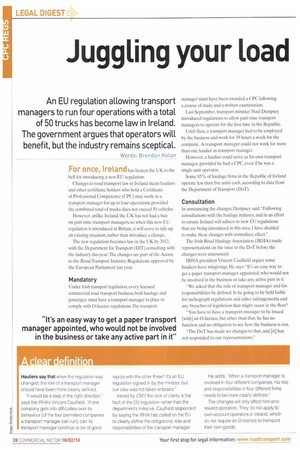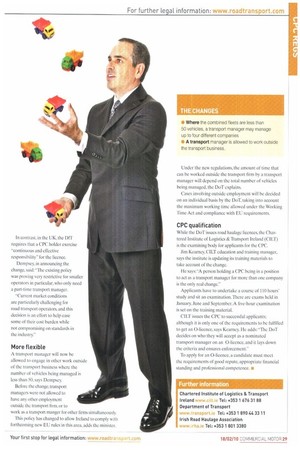Juggling your Load
Page 28

Page 29

If you've noticed an error in this article please click here to report it so we can fix it.
An EU regulation allowing transport managers to run four operations with a total of 50 trucks has become law in Ireland. The government argues that operators will benefit, but the industry remains sceptical.
Words: Brendan Nolan
For once, Ireland has beaten the UK to the
bell for introducing a new EU regulation.
Changes to road transport law in Ireland mean hauliers and other certificate holders who hold a Certificate of Professional Competence (CPC) may work as a transport manager for up to four operations. provided the combined total of trucks does not exceed 50 vehicles.
However, unlike Ireland, the UK has not had a ban on part-time transport managers, so when this new EU regulation is introduced in Britain, it will serve to tidy up an existing situation, rather than introduce a change.
The new regulation becomes law in the UK by 2012, with the Department for Transport (DfT) consulting with the industry this year. The changes arc part of the Access to the Road Transport Industry Regulations approved by the European Parliament last year.
Mandatory
Under Irish transport legislation, every licensed commercial road transport business, both haulage and passenger. must have a transport manager in place to comply with 0-licence regulations. The transport manager must have been awarded a CPC following a course of study and a written examination.
Last September. transport minister Noel Dempsey introduced regulations to allow part-time transport managers to operate for the first time in the Republic.
Until then, a transport manager had to be employed by the business and work for 39 hours a week for the company. A transport manager could not work for more than one haulier as transport manager.
However, a haulier could serve as his own transport manager, provided he had a CPC, even if he was a single-unit operator.
Some 85% of haulage firms in the Republic of Ireland operate less than five units each, according to data from the Department of Transport (DoT).
Consultation
In announcing the changes. Dempsey said: "Following consultations with the haulage industry, and in an effort to ensure Ireland will adhere to new EU regulations that are being introduced in this area. I have decided to make these changes with immediate effect."
The Irish Road Haulage Association (IRHA) made representations on the issue to the DoT before the changes were announced.
IRHA president Vincent Caulfield argues some hauliers have misgivings. He says: -It's an easy way to get a paper transport manager appointed, who would not be involved in the business or take any active part in it.
"We asked that the role of transport manager and his responsibilities be defined. Is he going to be held liable for tachograph regulations and other infringements and any breaches of legislation that might occur in the fleet?
"You have to have a transport manager to be issued [with] an 0-licence; but other than that, he has no function and no obligation to see how the business is run.
"The DoT has made no changes to that, and [it] has not responded to our representations." In contrast, in the UK, the DfT requires that a CPC holder exercise "continuous and effective responsibility" for the licence.
Dempsey, in announcing the change, said: "The existing policy was proving very restrictive for smaller operators in particular, who only need a part-time transport manager.
"Current market conditions are particularly challenging for road transport operators. and this decision is an effort to help ease some of their cost burden while not compromising on standards in the industry."
More flexible
A transport manager will now he allowed to engage in other work outside of the transport business where the number of vehicles being managed is less than SO, says Dempsey.
Before the change, transport managers were not allowed to have any other employment outside the transport firm, or to work as a transport manger for other firms simultaneously.
This policy has changed to allow Ireland to comply with forthcoming new EU rules in this area. adds the minister. Under the new regulations, the amount of time that can be worked outside the transport firm by a transport manager will depend on the total number of vehicles being managed, the DoT explains Cases involving outside employment will he decided on an individual basis by the DoT, taking into account the maximum working time allowed under the Working Time Act and compliance with EU requirements.
CPC qualification
While the DoT issues road haulage licences, the Chartered Institute of Logistics & Transport Ireland (CILT) is the examining body for applicants for the CPC.
Jim Kearney, CILT education and training manager, says the institute is updating its training materials to take account of the change.
He says: "A person holding a CPC being in a position to act as a transport manager for more than one company is the only real change."
Applicants have to undertake a course of 110 hours' study and sit an examination.There are exams held in January June and September. A five-hour examination is set on the training material.
CILT issues the CPC to successful applicants; although it is only one of the requirements to be fulfilled to get an 0-licence, says Kearney. He adds: "The DoT decides on who they will accept as a nominated transport manager on an 0-licence, and it lays down the criteria and ensures enforcement."
To apply for an 0-licence, a candidate must meet the requirements of good repute, appropriate financial standing and professional competence. a
Further information
Chartered Institute of Logistics & Transport Ireland Tel: +353 1 676 31 88 Department of Transport Tel: +353 1 890 44 33 11
Irish Road Haulage Association www.irha.te Tel: +353 1 801 3380
































































































































